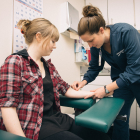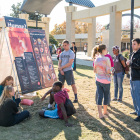By Anna Streetman, News Editor
After a tuberculosis (TB) case was confirmed at Kennesaw State, campus health officials have set up TB tests for all students.
A statement released on KSU’s website on January 30 informed students that testing will take place Feb. 3 and Feb. 5 in the Social Science Building and student health services in University Village. The first test is a skin test. Health officials will then return to campus on Feb. 5 to interpret the skin test results. Health officials from KSU have contacted 200 students who were exposed to the infected student to encourage them to get tested. Other students and faculty members are also highly encouraged.
According to a statement from Dr. Megan Bowles, Medical Director at Kennesaw State, there is a difference between the TB virus and TB disease: “People with TB disease are sick from the germs that are active in their body,” she said in an advisory to the campus. “They may cough a lot, feel weak, have a fever, lose weight, cough up blood or sweat a lot at night. People with TB disease are capable of giving the infection to others. People with latent TB infection have the TB germ in their body, but they are not sick because the germ is inactive. They cannot spread the germ to others. TB can be treated and cured.”
Dr. Bowles continues by saying that the risk of exposure and infection to the general campus population is “extremely low.” Despite low risk, Bowles says the university is taking “every precaution as recommended by the state of Georgia tuberculosis guidelines.”
Dean of Students Dr. Sanseviro says it’s important to stress “the exposure and risk is extremely minimal.” However, he encourages anyone with concerns to speak with Health Services and get a free TB test.
Communication major Michael J. Moore is concerned about the TB outbreak: “It’s easy to be relaxed about the disease spread and think it won’t happen to you, but you just never know,” he says. “Airborne diseases like those are easy to catch so it’s just as easy to be paranoid about the person right next to you.” Moore says he plans on getting tested on Feb. 3.
Senior communication major Bailey Thompson isn’t as concerned: “I live off-campus and don’t hang out with tons of people on campus so I’m not worried,” she says. “I’m also very good about keeping up with proper hygiene guidelines, especially during the winter. Plus, I know KSU will be doing everything they can to keep us safe.”
The Center for Disease Control and Prevention website cites tuberculosis as a disease caused by a bacterium called Mycobacterium tuberculosis. The bacterium usually attacks the lungs, but can also attack any part of the body, such as the kidney, spine, and brain. TB is spread trough the air, but not through general contact with others, such as shaking hands or touching bed linens or toilet seats. The website also cites that TB was once the leading cause of death in the United States. TB can be effectively treated and cured.
Further information, such as FAQs, can be found at http://studenthealth.kennesawstateauxiliary.com, or by contacting KSU Student Health Services at 470-578-6644 or email Dr. Megan Bowles at mbowles4@kennesaw.edu.




